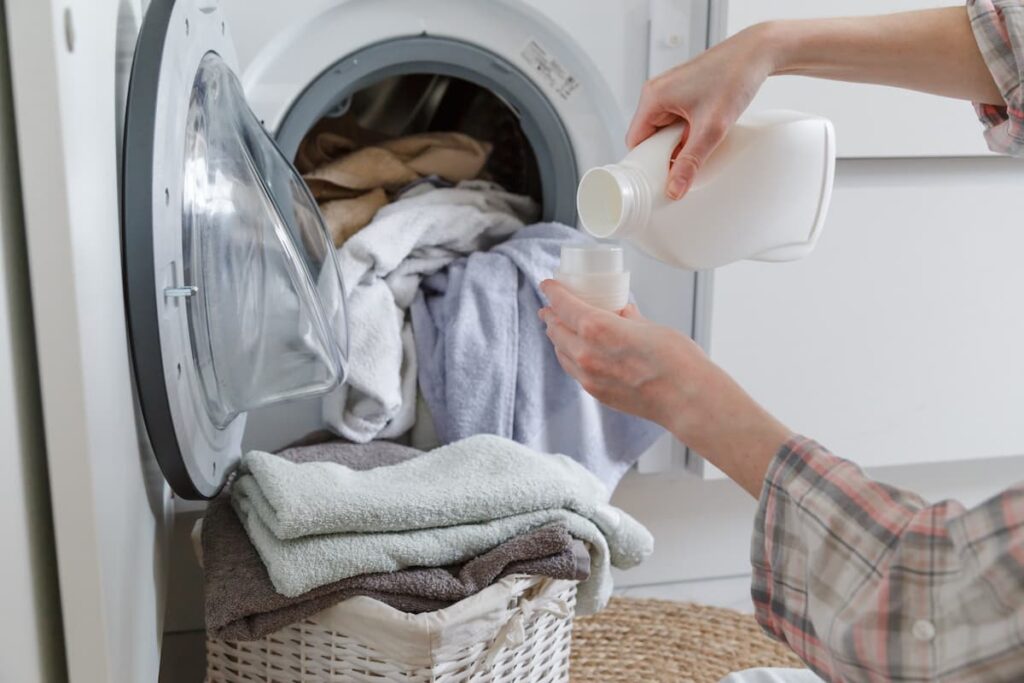Doing laundry can be a headache any day of the week. However, it becomes even more of a nuisance when you’re unsure what goes in with what. Can we wash our towels and our clothes together?
Towels and clothes can be washed together, but cleaning them separately is better to prevent germs and lint from spreading. Unlike towels, your clothes may also need specific care, so washing them in separate loads whenever possible is better.
Through this article, we’ll try to answer some of your most common laundry-related questions. From whether you should wash towels and clothes together to what you should never wash towels with, we’ll go over it all, so read until the end and make your laundry day easier.

Can You Wash Towels With Clothes?
Doing a load after a load of laundry can be exhausting. It’s understandable why people try to speed up the process by washing multiple items, such as towels and clothes, all at once. Unfortunately, this is not the recommended method of doing laundry.
While you can wash towels and clothes together, there are many reasons why they should not be. The most important reason is to prevent germs from transferring to your towels and coming in contact with your body.
Clothes Transfer Germs
Metros, bus stations, parks, offices, and restaurants are all very public and busy places where you can come in contact with millions of germs. These germs are transferred onto your clothes.
On the other hand, towels tend to be kept in one place, so their interaction with germs is limited. We use towels directly on our skin, so they must be sanitized; otherwise, you’d be vulnerable to many bacteria.
To prevent yourself from coming in contact with the many germs your clothes have collected, it’s recommended to wash towels and clothes separately.
Clothes and Towels Require Different Temperatures
Another reason why you should consider doing two different loads for your clothes and towels is that they can require two different temperatures.
Many prefer washing their towels at higher temperatures as hotter water kills more germs. The ideal temperature for washing towels to kill bacteria is around 160°F (71°C). This kind of temperature may not be appropriate for your clothes.
Washing your clothes in boiling water can damage delicates, discolor your clothing, or even ruin it.
Hot water can also shrink your clothes, especially the ones made from cotton, linen, or wool. Many people are also concerned about polyester shrinking, so check out this article that explains whether polyester can shrink and the best ways to wash it.
Towels Can Add Lint To Your Clothes
Towels produce lint. Since towels are made of cotton, they shed a lot of lint. This lint can be visible on your clothes, especially on black fabrics. Of course, a lint roller can clear it all up, but why bother when you can wash towels separately?
Set your towels aside to wash in a single load to avoid lint buildup on your clothes.
Can You Wash Towels and Sheets Together?
You should not wash towels and sheets together because towels produce lint that can get on your sheets. Sheets and towels also require different temperatures to be cleaned well. Additionally, washing sheets with towels can prevent them from being adequately cleaned.
The sheets may cover the towels. So washing towels and sheets together will prevent them from being adequately cleaned.
What Should You Not Wash Towels With?
We’ve already realized that washing towels with clothes or bed sheets are not the best idea. However, the list does not end there. There are other materials that you should separate from your towels.
You should not wash your towels with your jeans or your kitchen towels. The texture of your jeans will make the towels rough, and the colors may run and discolor your towels. Kitchen towels contain a lot of germs because they’re used to clean dishes and counters, so you should wash them separately.
A study concluded that kitchen towels contained a lot of bacteria and could also cause food poisoning. Hence, separating them from your bath towels is vital in ensuring that your body is protected from these germs and that your bath towels are spotless.
Knowing this can cause you to doubt other laundry loads you’ve become used to, such as washing your socks and underwear together. If that’s the case, consider heading to this article, where we go over why you shouldn’t be washing socks and underwear together.
How Often Should I Wash My Bath Towels?
Washing towels separately is genuinely the ideal way of ensuring they’re pristine and germ-free.
You should wash your bath towels every single week. However, this number can change depending on how often you use them. As a general rule, wash the towels after three uses.
Washing your towels every week is an excellent way of ensuring that your body remains protected from germs and that your towels are always soft. Ideally, you should wash your towels after two to three showers, so if you’re showering multiple times a day, you should wash your towels more frequently.
What Cycle Do You Wash Towels On?
Not only is it essential to wash your towels separately, but it is also crucial to wash them properly. One aspect of doing laundry that is essential in ensuring that your clothes and towels are not damaged, but comes out fresh and clean, is knowing what cycles to use.
A regular washing cycle is adequate for washing towels. However, it’s better to have longer wash cycles with a hotter temperature so that your towels are immaculate. Additionally, it’s necessary to select ‘cotton’ as the washing cycle option, as towels are made of cotton.
This setting utilizes higher speeds, which may make it harsher for delicates, but makes it the ideal location for towels.
Final Thoughts
Doing a separate load for towels is the best way of washing them because it prevents germs from other clothes and materials from coming in contact with the towels and prevents the towel’s lint from going on different materials.
Washing towels is not tricky, but it requires you to follow certain guidelines, such as the specific cycles and temperatures needed to wash your towels. Following those will ensure that your towels are clean and feel soft and fluffy.





